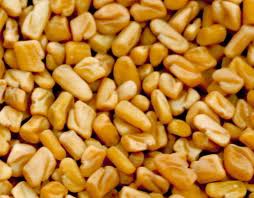The EU has banned the import of some Egyptian seeds and beans after fenugreek was linked to the E. coli outbreaks in Germany and France.
Egyptian fenugreek seeds have been linked to both outbreaks
The European Food Safety Authority linked a batch of fenugreek seeds to outbreaks which claimed 49 lives.
Imports of seeds and beans “for sprouting” will be frozen until 31 October, EU officials said.
All fenugreek seed imported from one particular Egyptian company since 2009 would be destroyed, they added.
Seeds and spores
Member states decided to impose the ban after seeing the European Food Safety Authority (EFSA) report, the European Commission said in a news release.
Continue reading the main story
- Do not eat sprouted seeds such as alfalfa, mung beans (or bean sprouts) and fenugreek raw
- Cook sprouted seeds until steaming hot throughout
- Clean equipment used for sprouting seeds
- Wash hands after handling seeds intended for planting or sprouting
“The decision provides that imports of Egyptian seeds and beans for sprouting are suspended until 31 October,” it added.
The banned items were defined as “seeds, fruit and spores used for sowing; leguminous vegetables, shelled or unshelled, fresh or chilled; fenugreek; dried leguminous vegetables, shelled, whether or not skinned or split; soya beans, whether or not broken; other oil seeds and oleaginous fruit, whether or not broken”.
In 2010, the EU imported about 49,000 tonnes of the types of seeds affected by the ban from Egypt , the commission said.
Their total value was more than 56m euros (£51m; $81m).
“The report published today leads us to withdrawing some Egyptian seeds from the EU market and to a temporary ban on imports of some seeds and beans originating from that country,” the European Commission’s Health and Consumer Commissioner, John Dalli, was quoted in the press release as saying.
“The commission will continue to monitor the situation very closely and will take additional measures if necessary.”
Link found
A single batch of fenugreek seeds is the likely cause of both a major outbreak of highly toxic E. coli – STEC O104:H4 – in Germany in May, and a smaller outbreak in France detected late last month, the EFSA said in its report.
The first outbreak caused 48 deaths in Germany and one in Sweden, while the total number of cases reported in the EU, Norway and Switzerland is 4,178, according to the agency.
In Begles, near Bordeaux in south-western France, seven people became infected after eating vegetable sprouts.
However, the death of a 78-year-old Frenchwoman in Bordeaux this month from a kidney disease caused by E. coli was not linked to STEC O104:H4, French officials said.
Other batches of fenugreek imported from Egypt during the period 2009-2011 might also be contaminated, the EFSA warned.
The actual contamination of the seeds with STEC O104:H4, it said, reflected “a production or distribution process which allowed contamination with faecal material of human and/or animal origin”.
“Where exactly this took place is still an open question,” the EU agency added.
Source: BBC

